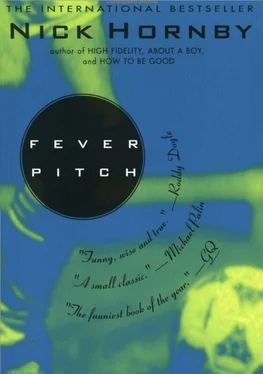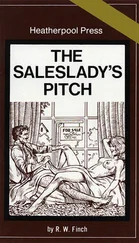On 1st May, two weeks and two days later, Arsenal played Norwich at Highbury, our first game since the disaster. It was a glorious Bank Holiday afternoon, and Arsenal played wonderfully well, and won 5-0; as far as everyone there that day, myself included, was concerned, everything seemed more or less all right with the world again. The mourning period was over, the TV cameras were there, the sun was out, Arsenal were scoring goals galore … after the bleakness of the previous fortnight, the match took on a celebratory air. It was a tired and muted celebration, but it was a celebration nonetheless, and from this distance that looks particularly bizarre now.
What were we all thinking of that afternoon? How on earth did the Forest-Liverpool game ever get replayed? It’s all a part of the same thing, in a way. I went to the Arsenal-Norwich game, and loved it, for the same reasons I had watched the Liverpool-Juventus final after the Heysel disaster, and for the same reasons that football hasn’t really changed that much in over a hundred years: because the passions the game induces consume everything, including tact and common sense. If it is possible to attend and enjoy a football match sixteen days after nearly a hundred people died at one—and it is possible, I did it, despite my new post-Hillsborough realism—then perhaps it is a little easier to understand the culture and circumstances that allowed these deaths to happen. Nothing ever matters, apart from football.
LIVERPOOL v ARSENAL
26.5.89
In all the time I have been watching football, twenty-three seasons, only seven teams have won the First Division Championship: Leeds United, Everton, Arsenal, Derby County, Nottingham Forest, Aston Villa and, a staggering eleven times, Liverpool. Five different teams came top in my first five years, so it seemed to me then that the League was something that came your way every once in a while, even though you might have to wait for it; but as the seventies came and went, and then the eighties, it began to dawn on me that Arsenal might never win the League again in my lifetime. That isn’t as melodramatic as it sounds. Wolves fans celebrating their third championship in six years in 1959 could hardly have anticipated that their team would spend much of the next thirty years in the Second and Third Divisions; Manchester City supporters in their mid-forties when the Blues last won the League in 1968 are in their early seventies now.
Like all fans, the overwhelming majority of the games I have seen have been League games. And as most of the time Arsenal have had no real interest in the First Division title after Christmas, nor ever really come close to going down, I would estimate that around half of these games are meaningless, at least in the way that sportswriters talk about meaningless games. There are no chewed nails and chewed knuckles and screwed-up faces; your ear doesn’t become sore from being pressed up hard against a radio, trying to hear how Liverpool are getting on; you are not, in truth, thrown into agonies of despair or eye-popping fits of ecstasy by the result. Any meanings such games throw up are the ones that you, rather than the First Division table, bring to them.
And after maybe ten years of this, the Championship becomes something you either believe in or you don’t, like God. You concede that it’s possible, of course, and you try to respect the views of those who have managed to remain credulous. Between approximately 1975 and 1989 I didn’t believe. I hoped, at the beginning of each season; and a couple of times—the middle of the 86/87 season, for example, when we were top for eight or nine weeks—I was almost lured out of my agnostic’s cave. But in my heart of hearts I knew that it would never happen, just as I knew that they were not, as I used to think when I was young, going to find a cure for death before I got old.
In 1989, eighteen years after the last time Arsenal had won the League, I reluctantly and foolishly allowed myself to believe it was indeed possible that Arsenal could win the Championship. They were top of the First Division between January and May; on the last full weekend of the Hillsborough-elongated season they were five points clear of Liverpool with three games left to play. Liverpool had a game in hand, but the accepted wisdom was that Hillsborough and its attendant strains would make it impossible for them to keep winning, and two of Arsenal’s three games were at home to weaker teams. The other was against Liverpool, away, a game that would conclude the First Division season.
No sooner had I become a born-again member of the Church of the Latterday Championship Believers, however, than Arsenal ground to a catastrophic halt. They lost, dismally, at home to Derby; and in the final game at Highbury, against Wimbledon, they twice threw away the lead to draw 2-2 against a team they had destroyed 5-1 on the opening day of the season. It was after the Derby game that I raged into an argument with my partner about a cup of tea, but after the Wimbledon game I had no rage left, just a numbing disappointment. For the first time I understood the women in soap operas who have been crushed by love affairs before, and can’t allow themselves to fall for somebody again: I had never before seen all that as a matter of choice, but now I too had left myself nakedly exposed when I could have remained hard and cynical. I wouldn’t allow it to happen again, never, ever, and I had been a fool, I knew that now, just as I knew it would take me years to recover from the terrible disappointment of getting so close and failing.
It wasn’t quite all over. Liverpool had two games left, against West Ham and against us, both at Anfield. Because the two teams were so close, the mathematics of it all were peculiarly complicated: whatever score Liverpool beat West Ham by, Arsenal had to halve. If Liverpool won 2-0, we would have to win 1-0, and so on. In the event Liverpool won 5-1, which meant that we needed a two-goal victory; “YOU HAVEN’T GOT A PRAYER, ARSENAL”, was the back-page headline of the Daily Mirror .
I didn’t go to Anfield. The fixture was originally scheduled for earlier in the season, when the result wouldn’t have been so crucial, and by the time it was clear that this game would decide the Championship, the tickets had long gone. In the morning I walked down to Highbury to buy a new team shirt, just because I felt I had to do something, and though admittedly wearing a shirt in front of a television set would not, on the face of it, appear to offer the team an awful lot of encouragement, I knew it would make me feel better. Even at noon, some eight hours before the evening kick-off, there were already scores of coaches and cars around the ground, and on the way home I wished everyone I passed good luck; their positiveness (“Three-one”, “Two-nil, no trouble”, even a breezy “Four-one”) on this beautiful May morning made me sad for them, as if these chirpy and bravely confident young men and women were off to the Somme to lose their lives, rather than to Anfield to lose, at worst, their faith.
I went to work in the afternoon, and felt sick with nerves despite myself; afterwards I went straight round to an Arsenal-supporting friend’s house, just a street away from the North Bank, to watch the game. Everything about the night was memorable, right from the moment when the teams came on to the pitch and the Arsenal players ran over to the Kop and presented individuals in the crowd with bunches of flowers. And as the game progressed, and it became obvious that Arsenal were going to go down fighting, it occurred to me just how well I knew my team, their faces and their mannerisms, and how fond I was of each individual member of it. Merson’s gap-toothed smile and tatty soul-boy haircut, Adams’s manful and endearing attempts to come to terms with his own inadequacies, Rocastle’s pumped-up elegance, Smith’s lovable diligence … I could find it in me to forgive them for coming so close and blowing it: they were young, and they’d had a fantastic season and as a supporter you cannot really ask for more than that.
Читать дальше











